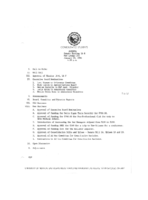Search the Special Collections and Archives Portal
Search Results

Congregation Ner Tamid Annual Report, 2006-2007
Date
Archival Collection
Description
2006-2007 annual report for Congregation Ner Tamid on the Greenspun Campus for Jewish life, learning, and spiritual renewal. The report includes statements, events, communities activities, statements, and photographs.
Mixed Content

Transcript of interview with Elizabeth "Betty" Krolak by Irene Rostine, September 26, 1995
Date
Archival Collection
Description
In 1962, Elizabeth “Betty” Krolak moved from the Midwest to Las Vegas with her husband and six children. Not only would the drier desert climate benefit her youngest daughter’s health due to asthma, but the family hoped the Las Vegas economy would be beneficial for their future. Prior to her arrival in Las Vegas, Betty worked briefly as a secretary for the New York Central Railroad before becoming a stay-at-home mom and active member of the PTA. Upon their arrival in Las Vegas, Betty’s husband enrolled in a real estate class, but was unable to complete the program. Betty, not wanting to waste the $80 they had spent on the class, decided to attend in his place. This decision led to life changing events for Betty and her family over the next four decades. After taking the real estate class and passing the test, Betty became a licensed Nevada real estate broker in October of 1963. She initially went to work for Pyramid Realty and, in 1964, she opened her own office, Clark County Realty. After her divorce in 1967, Betty was left with “six hungry children” to feed and no child support or health insurance. She recalls how the benefits of being in real estate really became apparent during this period of her life. While real estate required long hours seven days a week, it also afforded a single mother flexibility that other careers would not have offered. Likewise, a woman could make more money in real estate in the 1960s and 1970s than most other careers provided, which was particularly important for Betty who was committed to raising her children without public assistance. Betty’s oral history chronicles the growth of the Las Vegas Board of Realtors which has grown into what today is the Greater Las Vegas Association of Realtors (GLVAR). She recalls how, in the 1960s, meetings took place in bowling allies and the primary role of the GLVAR was to provide networking opportunities and represent the Code of Ethics for realtors. However, the Board was dominated by males, with the role of women members confined to planning social events and arranging for refreshments. In 1968, Betty and several other women realtors set out to change this by initially establishing a local Women’s Council within the Board. In the years following, Betty became the first women to be an Executive Board Member. Today, more than half the members of the Executive Board are women. Betty’s oral history also speaks to many changes within the real estate industry over the past four decades, some positive and some not so positive. She recounts the 1960s to the 1980s, when casino workers’ main source of income came from tips which were often unreported, creating challenges in getting casino workers qualified for home loans because they did not have the ability to document their source of income. Likewise, single women had a hard time qualifying for home loans because they only had one income and, in those days, it rarely was enough to qualify for a mortgage on their own. Also during this period, realtors primarily focused on the resale market because builders wanted to work directly with buyers, but changes in the real estate market eventually led builders to realize the benefits of allowing realtors to sell new houses, too. During her career, Betty also experienced the rise of real estate franchises, beginning with Century 21’s arrival in Nevada, the development of Multiple Listing Service (MLS), changes to educational requirements, approaches to settling disputes, and new approaches to ethics violations. Perhaps the biggest change Betty’s oral history speaks to is the personal approach to selling real estate that has been lost over time. In the early days, brokers sold houses right alongside the sales agents. Today, however, regulations have placed brokers in a position where their primary role is to manage sales people, not sell houses. Also, realtors used to interact with other realtors, title company personnel, and mortgage lenders before technology, such as fax machines and computers, came along. In the early days, documents were transferred in person allowing people in the industry to get to know one another through these personal interactions. Today, everything is done electronically and it is rare to actually know the person on the other end. Selling real estate has lost a lot of its personal touch, according to Betty. In addition to being the mother of six children and running one of the largest real estate offices in the area, Betty also found time to give back to the community through her volunteer work with the Salvation Army. She was instrumental in establishing Southern Nevada’s Angel Tree project, which provides Christmas presents to children who otherwise would not receive them. She was also appointed by Governor Michael O’Callahan to the State of Nevada’s Real Estate Commission, making her the first woman to serve on the Commission. Betty’s career in real estate allowed her to witness and implement many changes that still impact the industry today. When Betty began her career, Las Vegas’ population was just over 45 thousand. By the mid-1990s Green Valley, Spring Valley, North Las Vegas, Summerlin, and Sun City had been developed and the Valley’s population exceeded 1 million people. Betty Krolak’s career merged with the real estate boom as she helped find homes for those who wanted to make Las Vegas their home. She made sure the real estate industry’s growth included women, training mechanisms, and ethics which continue to benefit realtors, home buyers, and home sellers to this day.
Text

Danny Cluff oral history interview: transcript
Date
Archival Collection
Description
Oral history interview with Danny Cluff conducted by Claytee D. White on December 8, 2017 for the Remembering 1 October Oral History Project. In this interview, Danny Cluff discusses his attendance at the Route 91 Harvest music festival on the evening of the October 1, 2017 mass shooting in Las Vegas, Nevada with his friends and nephew. He talks of finding safety in Hooters with other survivors from the concert. When speaking of gun control, he discusses his perspectives on human nature, citing his experiences during and after the concert shooting. Throughout the interview, Cluff speaks of the ways he has healed and kept positive after the shooting, such as laughing through the hard times and writing poetry, of which he gives a few samples.
Text
Matt Gregory Entertainment Papers
Identifier
Abstract
Collection is comprised of the papers of Las Vegas producer, manager, and agent Matt Gregory from 1959 to 1986. Included are contracts, costume sketches, press releases, videos, show reviews, and advertisements. Also included are correspondence, public relations material, business related material, costume and set design drawings and sketches, slides, negatives, photographs, transparencies, and videos, mostly from the 1960s through the 1980s.
Archival Collection
Lori Lipman Brown Papers
Identifier
Abstract
The Lori Lipman Brown Papers date from 1975 to 2009 and document former Nevada State Senator Lori Lipman Brown's political career. It includes correspondence and materials from Brown's service as a Nevada State Senator from 1992 to 1994, case files from her defamation lawsuit against Nevada State Senator Kathy Augustine, and papers from her work opposing the Nevada Question 2 ballot measure on same-sex marriage in 2000. The collection also contains photocopies of biographical materials and personal and publicity photographs of Brown, as well as material from her time working with local high school and commmunity theatre programs.
Archival Collection
Tonopah Mining Company Records
Identifier
Abstract
The Tonopah Mining Company Records derive from the office of the company’s general manager in Tonopah, Nevada and consist of documents directly generated by its mining and milling operations from 1901 through 1941. The collection includes daily work reports, assay reports and certificates, employee time cards, invoices and receipts for mining equipment and supplies, monthly stores reports, and the company’s numerous insurance policies. Several of the company’s annual reports, including an original typescript copy of the 1907 annual report, are included in the collection. Additionally, select records from the company's subsidiary, Desert Power and Mill Company, as well as the Tonopah and Goldfield Railroad, which include overcharge claims, freight and repair bills, and delivery receipts are included in the collection.
Archival Collection
Art Wolf Professional Papers
Identifier
Abstract
The Art Wolf Professional Papers (1988-2018) document the career of museum professional and consultant Art Wolf who specialized in supporting cultural heritage of indigenous communities, particularly in the Southwest and Las Vegas, Nevada. Materials document Wolf's work with the American Alliance of Museums (AAM) as a board member, in conference planning, and as a Study Leader for Smithsonian Associates Study Tours. Also included are materials that represent Wolf's involvement as an alumni of the Leadership Las Vegas program and director of the Nevada State Museum. The collection includes some ephemera and invitations to different events held in Las Vegas, Nevada that Wolf was invited to. The collection also includes examples of unsuccessful bids for consultancy jobs through WOLF Consulting and his files as a master's thesis adviser for the Museum Studies program at Harvard Extension School.
Archival Collection
Florence Lee Jones Cahlan Photographs
Identifier
Abstract
The Florence Lee Jones Cahlan Photographs depict locations and events in Las Vegas, Nevada from 1909 to 1980. The photographs primarily depict historical locations, including the Las Vegas Mormon Fort, the Kiel Ranch, and plaques commemorating Las Vegas’s 75th anniversary. The photographs also depict celebrations, including the Diamond Jubilee festivities held to celebrate Las Vegas’s 75th anniversary, plaque dedications, building dedications, and the 50th anniversary of the arrival of the first mail planes in Las Vegas. The photographs include the Kennecott Copper Corporation’s facilities in McGill, Nevada, Western Airlines planes and pilots, and Union Pacific Railroad locomotives.
Archival Collection
Florence and Jerry Vallen Faculty Papers
Identifier
Abstract
The Florence and Jerry Vallen Faculty Papers (approximately 1935-2017) are comprised of personal papers and research files for Florence and Jerry Vallen, the founding dean of the College of Hotel Administration at the University of Nevada, Las Vegas (UNLV). The collection includes research files and drafts for
Archival Collection

Meeting minutes for Consolidated Student Senate University of Nevada, Las Vegas, January 30, 1986
Date
Archival Collection
Description
Text
